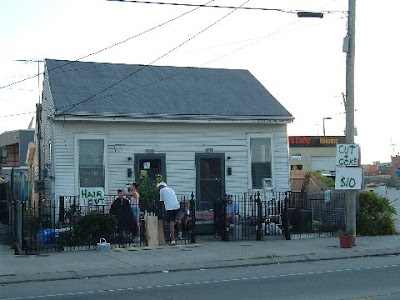You Have Permission!
Today's client session reminded me of one of the magical forces of professional organization, that you might be able to replicate merely by reading this entry! This issue applies to people who have a hard time letting go of things.
It's so simple it's hard to believe the effect it has on people. I simply give clients permission to let go of unwanted objects. Gifts they never liked. Sheets that no longer match. Hand-me-downs their kids will never wear. They ask me what they should do with a particular object, followed by something like "it was a gift, and I never really liked it." What they are seeking is permission, and I give it to them, and it changes their relationship to their stuff!
Sometimes there's a latent sense of guilt behind holding on to something we no longer love or need. Maybe we feel guilty for not "using it up." Maybe it's our natural environmentalism. Or maybe it's Depression-Era survival skills passed down through the generations. Wherever it comes from, I'm here to tell you it's ok to let go and let someone else benefit from the dust-collectors and space-thieves in your home.
As one organizer wrote somewhere (I can't remember where), "is it worth the cost of your home? Because that's what it's costing you!"
You have my encouragement to let go of all the stuff you're not using, you don't like, or that doesn't fit into your current life. If you fear that this is wasteful ("I spent so much money on the stuff, just to give it away!"), remember, that thought is focused on regretting the past (how much money you spent), and by doing so, you waste the present. The present is this: clearing out the old, the unused, the disliked, will open space for the new, the loved, the unknown. It will simplify your life in ways you can't imagine. I'm not saying it's always easy -- we hold lots of emotions, fears, desires, fantasies, and memories in our stuff. Sometimes it's hard to let go of the past and the future and the fantasies that they hold. But creating space for the here and now is the only way to really be in the here and now. And that's all we have, really.
Of course, decluttering responsibly means making sure your unwanted things don't end up in the trash. For information on where to donate your stuff in Chicago, please scroll down and also refer to the menu at the right for an older entry on where to donate anything from books to eyeglasses to old blankets. Please also email me for information on donating designer items for a fundraiser to save the rainforest in Indonesia, home of the near-extinct Orangutan. Thanks!
It's so simple it's hard to believe the effect it has on people. I simply give clients permission to let go of unwanted objects. Gifts they never liked. Sheets that no longer match. Hand-me-downs their kids will never wear. They ask me what they should do with a particular object, followed by something like "it was a gift, and I never really liked it." What they are seeking is permission, and I give it to them, and it changes their relationship to their stuff!
Sometimes there's a latent sense of guilt behind holding on to something we no longer love or need. Maybe we feel guilty for not "using it up." Maybe it's our natural environmentalism. Or maybe it's Depression-Era survival skills passed down through the generations. Wherever it comes from, I'm here to tell you it's ok to let go and let someone else benefit from the dust-collectors and space-thieves in your home.
As one organizer wrote somewhere (I can't remember where), "is it worth the cost of your home? Because that's what it's costing you!"
You have my encouragement to let go of all the stuff you're not using, you don't like, or that doesn't fit into your current life. If you fear that this is wasteful ("I spent so much money on the stuff, just to give it away!"), remember, that thought is focused on regretting the past (how much money you spent), and by doing so, you waste the present. The present is this: clearing out the old, the unused, the disliked, will open space for the new, the loved, the unknown. It will simplify your life in ways you can't imagine. I'm not saying it's always easy -- we hold lots of emotions, fears, desires, fantasies, and memories in our stuff. Sometimes it's hard to let go of the past and the future and the fantasies that they hold. But creating space for the here and now is the only way to really be in the here and now. And that's all we have, really.
Of course, decluttering responsibly means making sure your unwanted things don't end up in the trash. For information on where to donate your stuff in Chicago, please scroll down and also refer to the menu at the right for an older entry on where to donate anything from books to eyeglasses to old blankets. Please also email me for information on donating designer items for a fundraiser to save the rainforest in Indonesia, home of the near-extinct Orangutan. Thanks!


